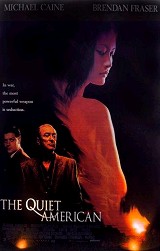| abcd |
Ziendan.net
|

|
| Hồsơ |
| Gianhập:
| Nov.4.2002 |
| Nơicưtrú:
| Global Village |
| Trìnhtrạng:
|
 [hiệntại không cómặt trên diễnđàn] [hiệntại không cómặt trên diễnđàn]
|
| IP:
| IP ghinhập |
|
Review of The Quiet American
Michael Caine and Brendan Fraser star in this quietly intense romantic thriller.
-- Spence D.
February 07, 2003 - This is a deceptively quiet movie, on all accounts. It literally snuck, with nary a sound, into selected theaters in New York and L.A. toward the end of 2002 and it has continued to pop up in theaters around the country with equal amounts of stealth since then. The thing that hasn't been quiet about the film, however, is star Michael Caine's vocal disapproval of how Miramax handled the distribution of the film (it's been in the can for some time and was destined to be shelved indefinitely at one point).
But all of that is merely secondary information in regards to the film itself, which is quiet, in that eerie, slow burn, dripping with noir sort of way. This is a film that is disarmingly reserved, yet manages to burrow its way under your skin and leave a lingering impression. A good portion of this is due to the performances of Caine and co-stars Brendan Fraser and Do Thi Hai Yen.

The basic story takes place in 1952 Vietnam and centers around British reporter Thomas Fowler (Caine), a man well beyond midlife, obviously escaping the drudgery of British life by "hiding" out in war torn Southeast Asia. Fowler's shacked up with the lovely Phuong (Yen), the combination of his lax job and the doting adoration of a woman half his age obviously sitting very well with him. Naturally, since this is a dramatic thriller, life cannot remain so idyllic. Enter Alden Pyle (Fraser), the titular American who is not only young, but exudes that rosy-cheeked Norman Rockwellian image of the heartland. Naturally sparks begin to fly between Phuong and Pyle and Fowler soon is watching his playboy lifestyle crumble before him.
The tense, cat and mouse love triangle unfolds on many levels, focusing on the power struggle between the older, presumably wiser, man (Fowler) and the younger, presumably naive man (Pyle), each trying to subtly outdo the other in an outwardly polite, but inwardly devious, display of obsession hidden under the guise of chivalry. In fact, the whole film is nothing more than a series of actions and events that are never really quite what they seem to be.
Caine is masterful as Fowler, a man who is slowly realizing that his days are numbered, that he is literally out-of-date. We see him struggling to maintain a false sense of youthful countenance in the face of change and chaos. Sure, it's Caine doing the kind of slimy bastard role he's become famous for, but here it's all about understated nuance and it's near brilliant. Additionally, Caine looks fitter and trimmer than he has in years. As for Fraser's performance, it's simultaneously grating and captivating, which is great because it's all so disarming. His good ol' Midwestern American boy shtick is played just this side of over-the-top and proves to be a wonderful dichotomy to Caine's performance. Yen delivers a counterpoint performance that is equal parts aloof and nonchalant; she is effectively the neutral color sandwiched between the two men.
Philip Noyce's direction is tight and refined, keeping the audience just enough off balance that the events that unfold are not too predictable, but rather surprising in a realistic way. Plus the cinematography of Christopher Doyle (a longtime Hong Kong cinematographer who has worked with Wong Kar-Wei, as well as on Philip Noyce's Rabbit-Proof Fence) is abundant with a rich, lush visage that maintains the tone of romantic intrigue. The element of music, however, provides one of the film's more obvious downsides. Composed by electronic maven Craig Armstrong, the score comes on rather strong. It literally saturates the entire film, pulsating through scenes that might otherwise have been better served by the sounds of silence.
-- Spence D.
-----------------------------
BETA TESTER
|

 TRANGCHỦ
TRANGCHỦ  Ghidanh
Ghidanh  Ðăngnhập
Ðăngnhập  Danhsách thànhviên
Danhsách thànhviên  Xem thưriêng
Xem thưriêng  Banquảntrị
Banquảntrị  Tìmkiếm
Tìmkiếm  Thắcmắc chung
Thắcmắc chung 

 Feb.8.2003 01:14 am
Feb.8.2003 01:14 am
 Xếp đềtài nầy vào mục cần theodõi
Xếp đềtài nầy vào mục cần theodõi  Email cho ngườiquen
Email cho ngườiquen  In đềtài nầy ra giấy
In đềtài nầy ra giấy